Why Does My Garage Door Open and Close By Itself?

When a garage door opens by itself, the reason may be less supernatural than you think. Garage doors are electrical systems and rely on wires, sensors and circuits to make your life easier. When something occurs in the system, it can send signals to your operator telling it to open or close your garage door. These systems are susceptible to damage, interference and more, but in many cases, the cause is something you can likely take care of yourself.
How to Fix a Garage Door That Opens By Itself
In the best case, a garage door opening by itself can be annoying. In more serious circumstances, it can place your property at risk for theft, expose your home to the elements or lead to injuries and liability concerns. If your garage door acts like it has a mind of its own, check to see if the answer is something simple. To try fixing the issue yourself, follow these steps:
- Check your sensors: All garage doors manufactured after 1993 have safety sensors included as part of the package. Garage door safety sensors typically mount near the floor or at the base of the tracks and send invisible signals across the opening of the garage. If the sensors fall out of alignment or detect movement while the door is closing, the operator automatically signals the door to open. Check each of your sensors for alignment, and sweep your garage free of any debris.
- Check your opener: Most garage door openers get a lot of use but don’t receive much attention. In some cases, the buttons on garage door openers can accumulate dirt and become stuck, sending repeat signals to your door. Clean all the buttons on your opener using alcohol, and open the housing to clean the connections. Be sure to inspect your wiring for any loose connections, exposed wires or damage. It’s also possible that one of your neighbors uses the same frequency as yours, but with today’s technology, such an issue is unlikely.
- Check the motor: Your motor is the brains of the operation and relies on a circuit board and transformer to keep your door working as designed. If you have a power surge or other electrical issue, it can damage these components and may cause your door to open and close without a command. If you have access to a multimeter, you can use it to test the voltage in and out of these components to see if they’re in working condition or hold the answer to your mystery.
Call the Experts
The most important part of any DIY garage door repair is creating a safe working environment and avoiding unnecessary risks. If your garage door opens by itself and you can’t locate the source of the problem, feel unsafe working on it yourself or need help implementing the solution, reach out to a professional. For expert garage door repair services anywhere in the Nashville or Gallatin areas, contact EXL Garage Doors today.
Why is My Garage Door So Loud?

Does your door make too much noise when you open it? The reasons for the new racket can vary. When garage doors squeal, bang, rattle and make other unusual sounds, it can be a source of frustration for you and the rest of the neighborhood. Thankfully, in most cases, you can save money — and your sanity — by fixing the problem yourself. Here’s how you can go about taking care of the issue.
How to Fix a Noisy Garage Door
The sounds a noisy garage door makes can differ, as can the causes behind them. Garage doors can rattle, squeal, bang, scrape, grind or make a combination of noises throughout operation. The best way to pinpoint the source of your extra noise is an inspection. Check all your components while the door is stationary, then listen and watch while using your door.
If your garage door is noisy, try these simple DIY fixes to silence it:
- Lubricate your components: Garage doors have many moving parts, and all of them require constant lubrication to perform their best. If your garage door squeals while opening and closing, it could be due to poor lubrication. Inadequate lubrication causes friction, which can also lead to vibrating, grinding and garage door screeching. Spray your springs, rollers, tracks, chain and other hardware down using a silicone lubricant to help quiet the door’s operation.
- Check your tracks for damage: When you open your garage door, the rollers move through the tracks mounted on each side, keeping the door aligned. If the tracks are bent or damaged, they can place pressure on the rollers and create a loud rubbing noise. If the damage is minor, you can pull the track back into place using the claw of a hammer. Insert the claw into the lip at the inside of the track and use it to bend the track back into its original position.
- Tighten or replace any loose parts: Garage doors vibrate when opening, and over time, your hardware can become loose and start making noise. Rattling sounds and squeaking are signs of loose parts, and they’re often something you can easily take care of in a matter of minutes. Inspect your garage door from top to bottom for any loose nuts, bolts, rollers, hinges or chains, making sure to tighten or replace anything that needs your attention.
- Perform regular maintenance: Once you take care of the cause of your noise, help keep your garage door working quietly with proper maintenance. At least once per year, inspect your garage door system for any damage, sounds and signs of wear. Clean any dirt and grime out of your tracks and lubricate the metal hardware, including the springs, bearings and rollers.
Professional Garage Door Care
Place the regular maintenance of your garage door in the hands of a professional. If you own a home in the Gallatin or Nashville areas, reach out to EXL Garage Doors to ask about our garage door maintenance services.
How to Fix Garage Door Rollers That Are Off Track

When your garage door doesn’t work as it should, getting your car in and out of the garage becomes less convenient. You may have to stop using the garage until you fix the issue, or you may need to get out of your vehicle and manually open and close the door when you leave and return home.
Off-track garage door rollers can lead to several issues. Fortunately, this problem is easy to fix with the help of a professional. You can also take steps to prevent your garage door rollers from going off track in the future.
Why Do Garage Doors Go Off-Track?
The typical garage door has 10 to 12 rollers, and one or more of them may go off track. Some common reasons rollers fall off the tracks include:
- Damaged tracks: Bent or damaged tracks can force rollers out of alignment.
- Loose tracks: The vibration of your door can loosen the bolts that hold the tracks in place.
- Force and impacts: If you hit your garage door with your car, you could send rollers off-track.
- Dirt and lack of lubrication: Built-up dirt and grime, along with a lack of lubrication, can throw rollers off-track.
How to Tell Whether Your Garage Door Rollers Are Off Track
If one or more of your garage door rollers are off track, there should be some visible signs, including:
- A door that’s stuck
- A door that hangs crookedly
- A door that’s hanging loosely
If you notice any problems with your garage door, don’t try to force it open or closed. Doing so could cause further damage to the tracks, push more rollers out of alignment or damage the door’s opening system.
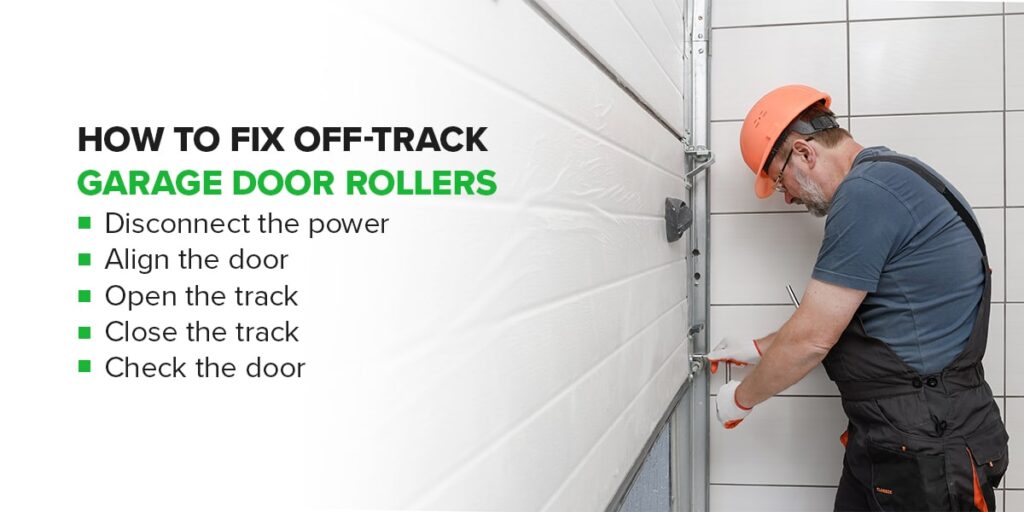
How to Fix Off-Track Garage Door Rollers
The best course of action to take when there’s a problem with your garage door rollers and tracks is to call a professional to inspect and repair the issue. A garage door repair technician will tighten, clean and lubricate the tracks and hardware. They’ll also get to work fixing any problems with the tracks themselves.
While the exact steps a technician follows will depend on the problem, you can typically expect them to do the following:
- Disconnect the power: Pull the rope hanging down from the motor to engage manual operation for the door.
- Align the door: Line the rollers up to the spot where they jumped off the track, locking the door in place with vice grips.
- Open the track: To make room for the roller, use a pair of pliers to work the track open, then guide the roller into place.
- Close the track: Using a rubber or wooden mallet, hammer the track back into shape to prevent the rollers from coming off again.
- Check the door: Open and close the door a few times to check the repair before reconnecting your automatic garage opener.
After the technician has put the rollers back on track, they can provide you with some maintenance tips to prevent the problem from recurring. Basic track maintenance includes:
- Inspecting the rollers and track: Check the track and rollers regularly, such as once a month. Look for signs of dirt or debris buildup and ensure the rollers are in the grooves of the track.
- Lubricate the track: Apply lubricant to the track so the rollers run smoothly. Your technician can recommend the best product for your garage door system.
Turn to EXL Garage Doors for Track Repair
If you’ve noticed a problem with your garage door tracks and rollers, EXL Garage Doors can help. Our professional technicians can get your garage door back on track quickly, either by fixing the track or replacing the rollers.
If your garage door is off-track in the Nashville or Gallatin area, contact EXL Garage Doors today.
notice that any rollers are already off-track, call a professional to assess the situation and complete the right repairs. Such an expert will know how to replace your garage door rollers if necessary. If your garage door is off-track in the Nashville or Gallatin area, contact EXL Garage Doors today.
Garage Door Maintenance Checklist
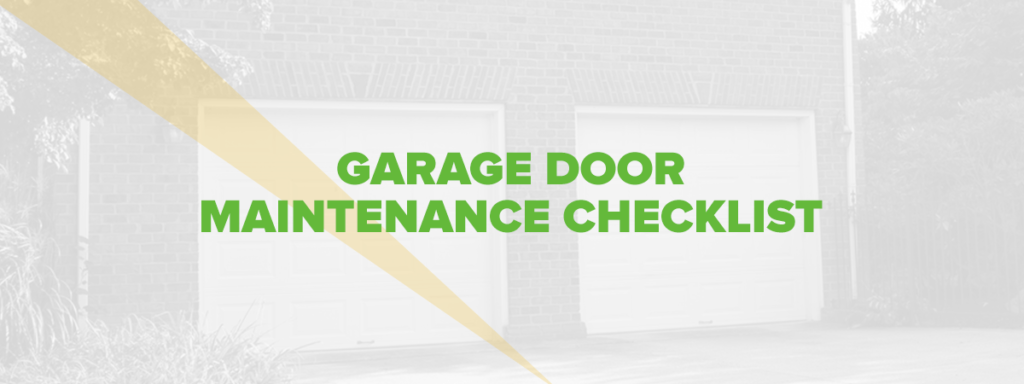
Like many homeowners today with garages, you may open and close your garage numerous times a day. You may not realize anything is wrong with your garage until something doesn’t work correctly or your garage makes an odd sound. However, it’s crucial to take preventative measures when it comes to your garage door — especially if you use it heavily. One way to make sure your garage door is in great shape is to keep up with regular maintenance. Trust professionals to perform garage door inspections and maintenance at least a few times a year, as they are more likely to catch anything wrong with your garage door and can fix it before it causes any more damage. In between professional maintenance visits, you can go through this garage door maintenance checklist to keep an eye on the different parts of your garage door.
Spring System
Broken garage door springs are one of the most common garage door issues. When you look at your garage door, there are usually two torsion springs above the door and extension springs on the side. These torsion springs are super strong pieces of metal that are tightly wound, creating potential energy that powers the springs to open and close your garage door when using the opener. The garage door opener acts to wind or unwind the springs for your garage door to open and close. Although these springs are designed to last about 10 years, all springs eventually wear out. Sometimes your garage may make a loud sound when springs no longer work, but sometimes your garage will not function correctly, have a hard time trying to close or open or stop working altogether when your springs break.
Since springs contain potential energy, you could severely hurt yourself if you attempt to replace your garage door springs alone. You must contact a professional garage door technician, who will arrive with the necessary tools and parts to repair the springs safely. However, just because a professional should perform replacement and maintenance doesn’t mean you can’t inspect springs as part of your regular garage door maintenance. Look for any visibly worn out, fragile or rusted springs and contact a professional if any look broken or like they’re about to break. You may be able to solve minor issues by applying lubricant.
If you’re unsure of the condition of your springs, you can do a garage door balance test. First, disconnect your door from the garage door opener, then manually lift your door. If you can’t open the door manually, call a professional at once. If it moves smoothly up and down, try leaving it half way. A well-balanced door will stay in place. If there is any movement, your door will likely fall down because the springs have lost tension. Never attempt to adjust the springs yourself and call a professional instead.
Hinges
Although your garage door hinges are small, they are necessary to ensure your garage door can still open and close. If your hinges break and go undetected, it could lead to more severe damage, such as messing up your door’s guide tracks or damaging panels, which could eventually lead to an entire door replacement. Wobbly or missing screws may be the first sign that you need to replace your hinges. If screws are loose or missing, the metal plate they were in may have deteriorated. Sometimes using a nut and bolt to replace the screw provides a temporary fix. You should regularly check to make sure your screws are tight, that nothing is bent or twisted and that the lifting cable is attached to the hinges at the bottom of the door correctly to ensure your door is in excellent condition.
You should also check regularly for any rust or corrosion when you inspect your hinges. You may opt to use an oil lubricant on your hinges and other moving parts on your door to help prevent corrosion and other wear. Consult with a garage door professional to learn how to lubricate your garage door and determine which lubricant you should use for your specific model. If your hinges go beyond minor issues and you suspect they need to be replaced, you should also refer to a professional for help as soon as possible. It’s a lot easier to have someone fix your hinges than replace your entire garage door. Keeping up with regular maintenance will ensure you know how your garage door is holding up, and know when it needs help from a professional.
Rollers
Your garage door rollers are crucial to smooth operation, opening and closing as your garage door should be. However, if you notice your garage door has gotten extra noisy when it opens and closes, your rollers are likely starting to misalign or aren’t moving correctly along the tracks. Sometimes rollers can be fixed with track grease, which helps the door open and close smoothly again and minimizes some of the noise, but other times rollers may need to be replaced. If your rollers don’t have enough lubrication, this could also lead to the garage door shaking, roller bearing failure and the loud opening and closing.
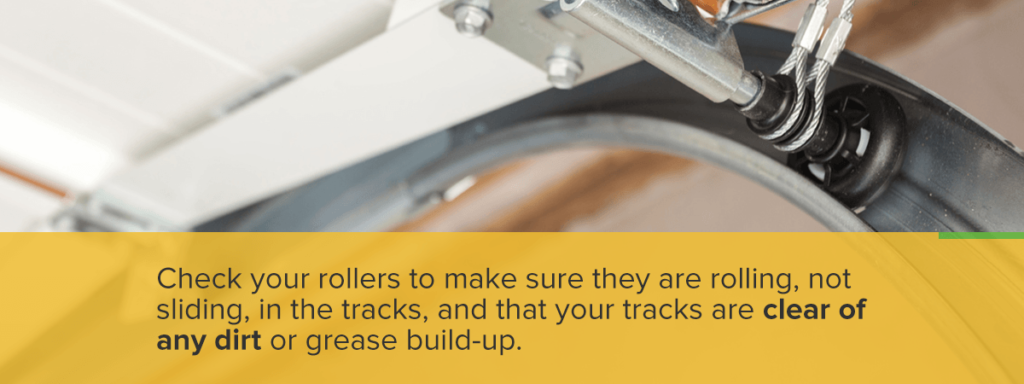
Check your rollers to make sure they are rolling, not sliding, in the tracks, and that your tracks are clear of any dirt or grease build-up. If your garage door tracks are filthy, your rollers may not move properly, so clean them regularly. Rollers may also go off of the tracks if the tracks aren’t anchored against the wall tightly, so check the brackets to make sure they are tight and that the tracks are where they should be. Be cautious of accidentally bumping your garage door with your car or any other large object, as this could also cause tracks to become misaligned and cause problems with rollers. If you keep up with maintenance and still suspect your rollers need to be replaced, contact a professional for help.
Lifting Cables
Garage door lifting cables are incredibly durable cables that allow your door to open and close by controlling the torsion springs. The cables prevent the springs from recoiling, so the springs can continue to do their job correctly to open and close the garage door safely. However, cables won’t last forever and may lose tension over time, so you must get them replaced when they’re showing signs of the end. How will you know when the cables are ready to be replaced? Usually, you simply have to look at your garage door. If your cable is rusted or frayed, you can tell by looking at it.
Additionally, if you notice any loud noises like screeching, rattling or grating, delayed opening and closing or not opening and closing at all, it could indicate a problem with your garage door cables. You should make sure your cables wind around the reel at the top of the vertical track and are functioning correctly. If your cables need to be replaced, make sure you trust a garage door professional to get the job done. If you attempt to replace cables yourself, you could be seriously injured since the spring and cable mechanism is fragile yet extremely powerful. You could also accidentally damage your garage door system, which could void your warranty.
Garage Door Opener and Sensors
If you’re having issues with your garage door opener and sensors, you could either repair your garage door opener or replace it altogether. However, it’s best to seek professional assistance when it comes to a faulty garage door opener so they can help determine which option would be best for you. If your garage door opener is 10 years old or older, a replacement is usually the best option, even if it could be fixed with a repair. Piling up repairs instead of replacing the opener is a temporary fix that will only lead to more repairs. Plus, new technologies are always emerging to take advantage of, so don’t get stuck with an outdated system.
To make the most of your garage door opener, however, make sure you regularly change the batteries in your remote. You should also make sure your garage door opener is compatible with a backup battery to use if the power goes out. If the power goes out and you don’t have a backup battery, you can’t open your garage door with your opener and would have to disconnect it from your opener and manually lift it. To test your garage door sensors, you could also conduct a reversal test. Start with an open garage door and put a 2-by-4 flat on the ground in the center of the door. Then, hit your opener to close the door. If the door hits the wood and doesn’t reverse immediately, you need to contact a professional for maintenance.
Contact EXL Garage Doors Today for Garage Door Maintenance and Repairs
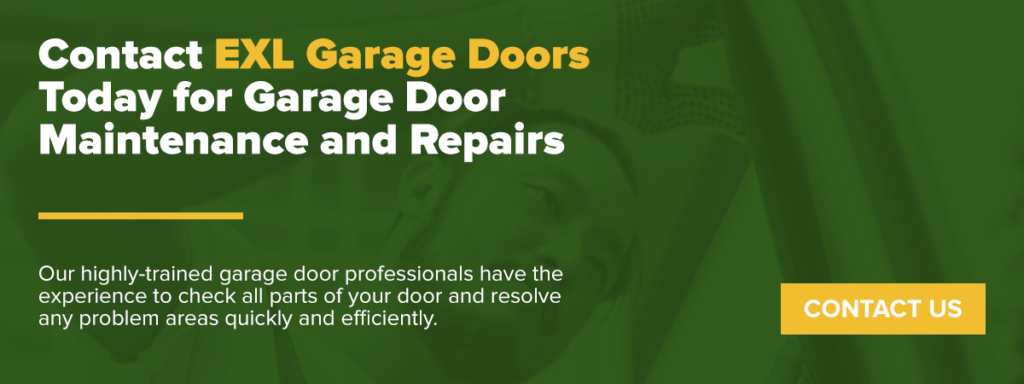
Whether your garage door needs some routine professional maintenance to ensure everything looks how it should or you suspect something is broken and needs to be repaired or replaced, don’t keep putting it off. EXL Garage Doors has served customers throughout middle Tennessee for more than 20 years and can help you find the best solution to prolong the life of your garage door. Our highly-trained garage door professionals have the experience to check all parts of your door and identify and resolve any problem areas quickly and efficiently. Don’t wait, contact us and request a service today to keep your garage door in its best possible condition.
